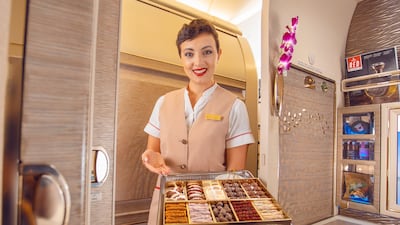Emirates airline and United Airlines have announced a codeshare agreement that executives promised would “terrify our competitors”, with non-stop flights between Newark and Dubai included in the deal.
The respective airlines hosted an event on Wednesday at Dulles International Airport near Washington to announce the codeshare. They unveiled a pair of their Boeing 777-300ER planes on the tarmac as cabin crew in Emirates and United uniforms appeared on stage.
From November, Emirates customers flying into Chicago, San Francisco and Houston — three of the biggest business hubs in the US — will be able to easily make connections on United flights to and from about 200 cities across the Americas on a single ticket.
At the eight other US airports served by Emirates — Boston's Logan International, Dallas-Fort Worth, LAX in Los Angeles, Miami International, New York's JFK, Florida's Orlando International, Seattle-Tacoma in Washington state and Dulles — the airlines will have an interline arrangement in place.
Emirates airline's president Tim Clark and United chief executive Scott Kirby touted the partnership as a major moment in “a robust pandemic recovery”.

“We welcome United's return to Dubai next year, where our Dubai help essentially becomes a gateway for United to reach Asia, Africa and the Middle East via the combined network of Emirates and flydubai,” Mr Clark said.
“This will defy the laws of physics when it comes to moving people across the planet. This is going to terrify our competitors.”
Codeshares are business arrangements in which two or more airlines agree to market and publish a particular flight as part of their own schedule or timetable. Only one airline operates the flight, but the other airlines marketing it can add their own unique flight number for marketing purposes and frequent-flyer programmes. Airlines use such pacts to expand their networks at little extra cost.
"United’s new flight to Dubai and our complementary networks will make global travel easier for millions of our customers, helping boost local economies and strengthen cultural ties," Mr Kirby said.
The agreement will allow Emirates to boost connectivity to US domestic markets and the Americas ― and offer a better value proposition for passengers with more seamless travel and increase load factors on its planes, said Andre Martins, head of transport, infrastructure and services for India, Middle East and Africa at Oliver Wyman.
United will widen its access to markets in the Middle East, Africa and Asia, where Emirates has a strong presence. This will increase the number of possible destinations through the networks of the Gulf airline and its sister airline Flydubai, Mr Martins said. United will also penetrate markets that were previously difficult to enter due to lack of bilateral agreements or difficult economics, he said. In May, United started direct flights from Washington DC to Amman Jordan three times a week.
The airlines' deal will "without a doubt ... reshape the industry in terms of the connectivity being offered and will benefit the two airlines on both sides of the Atlantic," Mr Martins said.
Mr Clark has shunned the idea of joining one of the global airline alliances, favouring instead bilateral agreements and partnerships such as Emirates' joint venture with Australia's Qantas Airways.
He has publicly endorsed an Emirates partnership with one of the “big three” US airlines since mid-2020, as the Covid-19 pandemic first unfolded and shook the aviation industry.
"The partnership between Emirates and United could generate huge amounts of revenue for both, opening up new traffic lanes and markets for both carriers," Linus Benjamin Bauer, founder and managing director of Bauer Aviation Advisory, said.
United’s direct service from Newark to Dubai will also "steal a chunk" of the passenger volume on one-stop flights from the US to the UAE via Star Alliance hubs in Europe, he added.
The "strong business case" for the Emirates-United partnership, coupled with the strong demand in both directions, can offset the higher operational complexity and inflexibility that can sometimes come with establishing new codesharing or interlining agreements, Mr Bauer said.
The Emirates-United partnership is likely to help the airlines to meet demand for lucrative international travel, which has recovered slower than domestic trips from the Covid-19 pandemic in most markets. Emirates, the world’s largest airline on international routes, does not have a domestic market.
The agreement marks a new era of co-operation following a years-long rivalry between the global airline over alleged government subsidies, which Gulf airlines have strongly denied.
The deal is likely to help United to compete better for customers flying to the Gulf region, after a recently expanded American Airlines deal with Qatar Airways raised the stakes.
American Airlines and Qatar Airways expanded their agreement to an additional 16 countries in June. The former said that the expansion would establish it “as the only US carrier to serve the Gulf region, seamlessly connecting through Doha with Qatar Airways”.
Abu Dhabi's Etihad Airways is also expanding a codeshare pact with US airline JetBlue to increase flights to New York.
For United flyers in the US, the deal may signal easier travel to India, too.
Emirates is the biggest foreign airline serving India, where direct flights from the US have become more complicated recently with Russian airspace closures.
The deal also comes as the US faces a severe pilot shortage.
Management consulting firm Oliver Wyman estimates the industry is facing a deficit of about 8,000 pilots, or 11 per cent of the total workforce. It says the shortfall could reach 30,000 pilots by 2025.
Mr Clark told Bloomberg TV that he expects Emirates to begin securing Boeing's long-delayed 777X jets in 2025.
The airline, which has been facing delays in deliveries of new widebodies as it seeks to ramp up growth, is also in discussions with Airbus for quicker delivery of its A350 widebodies. The airline expects to obtain the first deliveries in the summer of 2024.
Emirates is currently flying 70 of its 118 A380 superjumbos as it expects a return to pre-pandemic traffic levels in 2023.















